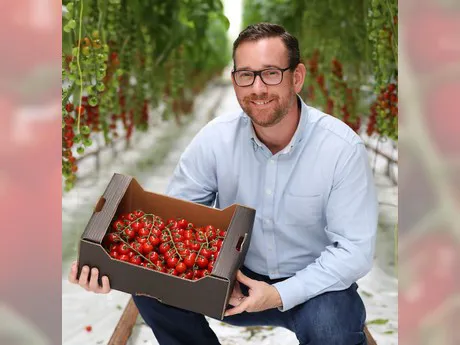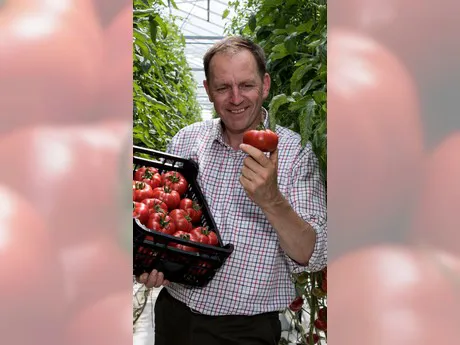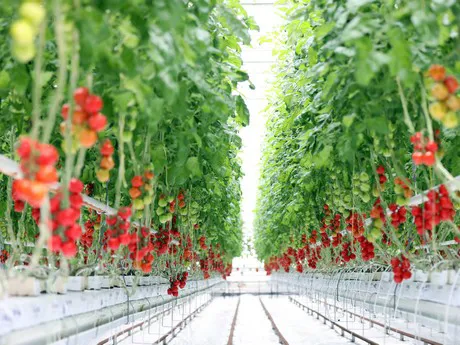 When it comes to their relations with retail and market agreements, the UK tomato growers play their own game. But when it comes to threats for the industry, or representing the industry, they know where to find each other. As a result, every year the British Tomato Fortnight is organized, putting this product in a spotlight for 2 weeks in a row. A nice occasion to talk with growers Andy Roe and Paul Falkner on the challenges in the industry, the importance of flavour in the UK market and connecting to the consumer.
When it comes to their relations with retail and market agreements, the UK tomato growers play their own game. But when it comes to threats for the industry, or representing the industry, they know where to find each other. As a result, every year the British Tomato Fortnight is organized, putting this product in a spotlight for 2 weeks in a row. A nice occasion to talk with growers Andy Roe and Paul Falkner on the challenges in the industry, the importance of flavour in the UK market and connecting to the consumer.
Busy times for UK tomato growers Paul Falkner with Eric Wall ltd (28 acres tomatoes in Barnham, West Sussex) and Andy Roe with Flavourfresh (31 acres tomatoes in Southport). British Tomato Fortnight, an annual initiative from the British Tomato Growers Association, starts today and lasts until June 2nd. By sending out samples, doing interviews and being all around, the grower cooperative tries to get as much positive attention for the UK tomato as possible.
With the UK tomato industry currently being on peak production, these are important weeks. Even though the number of growers in the UK is declining, the acreage is on the rise. British consumers value their locally grown tomatoes, something shown clearly in the rise of the specialty and snacking tomato acreage.

Paul Falkner
"It's good news for the industry as a whole", Paul says when asked about the growing UK acreage. "Even though the category is mature, there's still a huge amount of innovation taking place." He explains how growing local is valued by UK customers. "Tomatoes that are grown well, are the right variety and picked at the right time have a tremendous taste. By selling produce locally we can get them quicker from the vine to the customer and in the UK there's appreciation for that. Of course there are fantastic growers in Holland, Spain and Italy - but we have the benefit of selling fresh tasty tomatoes to our local market."
Importance of taste
Andy Roe agrees on the importance of taste in UK produce. "With Flavourfresh we recognised that the tomato sector was going to get very challenging over 20 years ago. Our policy became based around snacking and flavoursome tomatoes." As head of innovation, he focuses on finding the best flavoured tomatoes in the world and growing them commercially. "The incredible work carried out by all the seed companies has given us a 'candy store' of opportunities to develop our business. Edioso, Delisher, Piccolo, Goutini and Jester are just a few of our success stories. We have pioneered the best way to enhance the tomato flavour and created an overall eating experience. That's how we distinguish ourselves from the competition within the UK and abroad."

Andy Roe
Also at Eric Wall the varieties are picked based on taste. All their tomatoes are sold on the vine. With Roterno, Sunstream, Arlinta, Sophie Jane, Ruby Jewel and the newly introduced Caramella they offer a complete palette of sizes and shapes. "In the UK market consumers are demanding good flavour, and since we hardly export it's sensible all around for UK growers to focus on flavour. Of course we focus on cost efficiency as much as possible, but since we have the shorter lead times, we can capitalise on the flavour benefits. The faster the tomato gets from the vine to the customer, the fresher it is and the better the flavour".
Brexit and labour
Does this mean Brexit, possibly making the lead time of European competitors higher, is a blessing? Paul is clear. "We’ve heard different views, that it would be good if we would exit, but we for sure don't have that opinion. As a British grower we hope that the UK consumer will buy local first and foremost, but the choice they have is fantastic. We're not self-sufficient as a country, we need to have trade and the industry needs to expand. We believe in working together, with colleagues in Holland, Spain, Italy - wherever. It might be difficult sometimes, but ultimately we will be more productive."
Then there's labour, one of the biggest issues in global horticulture, and it's no different in the UK. "A lot of our employees are from Europe. They're fantastic - the backbone of our company. We want to make sure, as a company, that they feel welcome here", says Paul.
"My crystal ball is exhausted and needs recharging", Andy laughs when asked about Brexit. "There are a thousand options, of which there will be both good points and bad points. As a proactive forward thinking business we must embrace the outcome and remain focused on our mission to produce a world class product that we are proud of. Our biggest challenge will be ensuring that we attract very good quality staff. Our harvesting teams are fantastic and remain committed to our values, however times are changing and we need to be inventive and creative going forward to ensure this trend continues."
At Eric Wall, they calculate monthly bonuses and an end of season profit share to bind their labour force - but there's more than money. "Whenever we have visitors coming around, we make sure they talk to the team in the nursery and packhouse. We all have great admiration for the team working in the nursery: it's tough work and they do a tremendous job, often spotting pest and disease issues in the crop very early. The packhouse team are the ultimate guardians of quality and that’s something the company is famous for. We're very fortunate to have a stable workforce and are not as much affected as others by the labour issues. We are blessed and try to retain that. Expertise is really important."

Sharing the UK tomato story
The team with Eric Wall ltd does its best to educate people from outside the industry about this story. They're for example a LEAF demonstration farm, putting extra effort in telling the horticultural story outside the industry. This means they regularly open for visits from horticultural groups, school classes or other interested people, sharing the story on horticulture. The weekend after British Tomato Week ends, hundreds of LEAF farms will open their doors to the big public on Open Farm Sunday, inviting everybody over to learn about British farms (Sunday 9th June).
United industry
Besides promoting the industry, the British tomato growers work together on other topics as well. "The TGA does a great job getting the word out in the UK", Paul, also a member of the board of the British Tomato Growers Association, says. "When it comes to the relationship we have with our individual retail customers, we work separate of course. But when it comes to threats to the industry or representing the industry as a whole, we work together. "
The Rugose virus for example, and threats like Tuta Absoluta are handled together, supported by organisations such as Defra and Natural England. And there's more: by researching the efficiency of bumblebee pollination for example, or the use of CO2 the growers try to move ahead unitedly as well. The TGA is the central hub of this cooperation as well. "We believe in cooperating", Paul concludes. "In the UK and abroad, a lot of challenges we face are similar and working together makes us more productive. As a whole we have a bigger voice and jointly we can move forward further."
The British Tomato Week is a joint initiative from the UK tomato growers united in the British Tomato Growers Association. It actually lasts for a fortnight and will run from 20th May to June 2nd. Follow the British Tomato Growers Association on Twitter to stay up to date on the latest news.
